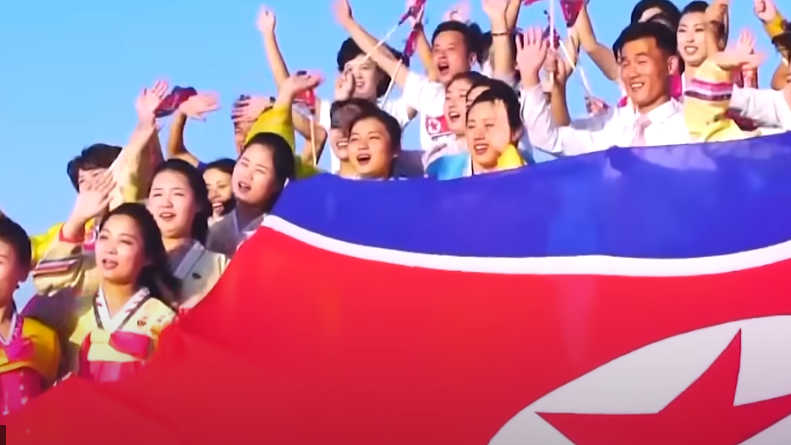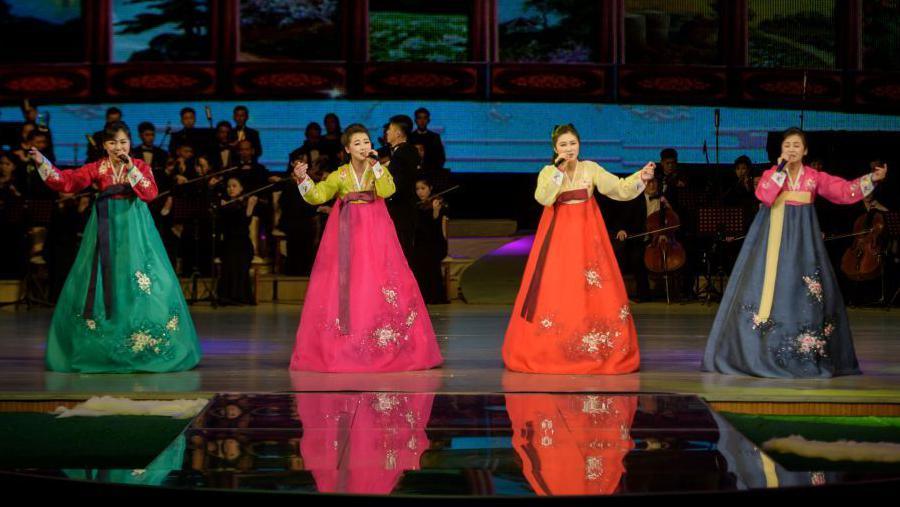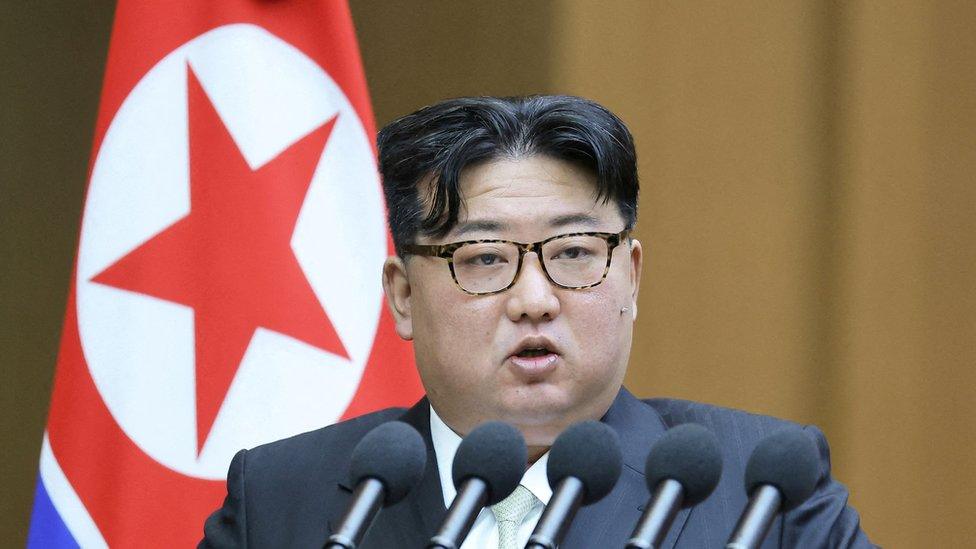Why North Korea's latest propaganda bop is a huge TikTok hit
Watch the North Korean propaganda song that’s a TikTok hit
- Published
When North Korean dictator Kim Jong Un released his latest song two weeks ago, surely he couldn’t have foreseen it becoming a hit on TikTok.
But the propaganda tune has gone viral online with Gen Z users bopping around to the synthy-electro pop.
Most are clearly quite oblivious to the Korean lyrics praising a man who’s vowed to “thoroughly annihilate the US” and launched dozens of ballistic missiles.
“Let’s sing Kim Jong Un, the great leader/ Let’s brag about Kim Jong Un, our friendly father,” the song goes.
It’s just a really great tune, TikTokkers say.
“Taylor Swift was not expecting to get blown out of the water right after dropping her new album,” one fan joked online.
“Wait, this slaps”, “This song needs a Grammy”, “It’s so dystopian in the catchiest way” – they are just some of the enthused comments under TikTok videos.
But the sunny pop hides something more sinister, experts say.
How to craft a propaganda hit
Friendly Father is just the latest in a line of propaganda pop songs churned out by the Communist state in the past 50 years.
It’s peppy, bright-tempoed and dangerously catchy – not that much different from Western pop hits.
But there is a certain Soviet-era tinge to it; Gen Z users describe it as “Abba-coded”, a reference to the Swedish superband.
“In this case, the song has Abba written all over it,“ says Peter Moody, a North Korea analyst at Korea University.
“It's upbeat, it could not be more catchy, and a rich set of orchestral-sounding sequences could not be more prominent,” he says.
But there’s more than just commercial considerations at play when writing a chart-topper in North Korea - authorities want an earworm that penetrates minds.
There’s no space for abstract phrasing or timing that’s overly complicated , says Alexandra Leonzini, a Cambridge University scholar who researches North Korean music.
Melodies have to be simple, accessible, something people can easily pick up.
Tunes also need to be pitched at a vocal range where they can be sung by most people. The masses can’t keep up with vocal gymnastics, so forget about multi-octave riffs.

A screengrab of the music video for Friendly Father, the latest North Korean propaganda song
Ms Leonzini says the songbook also rarely contains any tracks with real emotion. "The idea is they want to motivate, to strive towards a common goal for the benefit of the nation… they don't tend to produce songs like ballads,” she says.
There is zero tolerance for creative or artistic freedom in North Korea. It is illegal for musicians, painters and writers to produce works simply for the sake of art.
“All artistic output in North Korea must serve the class education of citizens and more specifically educate them as to why they should feel a sense of gratitude, a sense of loyalty to the party,” Ms Leonzini says.
North Korea’s government believes in the "seed theory", she adds, where every single work must contain an ideological seed, a message that is then disseminated en masse through art.
Music is one of its most powerful tools - and Pyongyang keeps its pop tracks for those at home. The state has paraded its opera troupes and symphony orchestras on overseas missions – but its lighter ensembles are kept for a domestic audience only.
North Koreans wake up every morning to propaganda songs blasted over village town squares, say defectors.
The song sheet and lyrics of the latest songs - which only come out sparingly - are printed in newspapers and magazines; usually they also have to learn dances to go with it, says Keith Howard, an emeritus professor of musicology at London’s School of Oriental and African Studies, who first visited North Korea in the 1990s.
“By the time the song has sort of been taken into the body, it’s become part of the person,” he says.
“So they know the lyrics so well, even if they're just doing the actions, even if they're just listening to it. A good ideological song does that - it needs to embed the message.”
Reading between the lines
And for regime watchers, the two-minute track released last month has an alarming new message.
While Western music fans have been dissecting Taylor Swift's new songs or breaking down the Kendrick Lamar v Drake diss tracks, North Korean experts have been scrutinising Friendly Father’s lyrics.
It’s not the first song dedicated to Mr Kim. But there’s a noticeable departure in the language and vocabulary used.
He is being referred to as “father” and “the Great” - terms previously reserved for North Korea’s first leader, his grandfather Kim Il Sung.
Mr Kim was called the "Great Successor” when he took over the mantle in 2012 after his father Kim Jong Il’s passing.
However, more than a decade on, analysts think this may be a sign that he is shoring up his image as North Korea's "Supreme Leader".
In recent times, he’s also replaced the lyrics in another propaganda song, switching out “our father Kim Il Sung” to “our father Kim Jong Un”.
It could be a sign of his direction. As a leader he has become increasingly hostile and aggressive in his rhetoric, pledging to build up his country’s military arsenal.
At the start of this year, he also declared the North would no longer seek reunification with the South, which he said was "public enemy number one". Reports say Pyongyang also demolished a major arch that symbolised hope for reunification with the South - an arch that had also been symbolic of his grandfather’s legacy.
“Songs are used to telegraph the direction the state is going in… to signpost important moments and important developments in politics,” Ms Leonzini says.
“A song is almost like the newspaper in North Korea.”

The creative arts are tightly controlled in North Korea, which prefers to show opera (pictured) to external audiences while keeping pop for domestic audiences
Meanwhile on TikTok, users are just enjoying the music. Some say they can’t stop listening to the song: on the way to work, at the gym, while doing homework.
Others are nostalgic, it reminds them of older Spanish and French pop or Eastern European styles, they say.
Existing North Korean music fans recommend the other big hits – there are only four or five state-endorsed North Korean bands, of which the Pochonbo Electronic Ensemble and the all-girl Moranbong Band are most cited.
“North Korea has a song called Potato Pride which is a song on how versatile and useful a potato is, if anyone’s interested,” one TikTokker suggests.
For many American users, the irony’s not been lost on them that a Communist song has gone viral on the Chinese-owned app while US lawmakers are trying to ban it.
It’s an idiosyncrasy that’s caught mass appeal.
British TikTokker Matas Kardokas made several meme videos using North Korean propaganda songs – one says: “Nobody in the trendy coffee shop knows that I am listening to North Korean propaganda music right now". It gained more than 400,000 likes.
“Something in me just clicked and I was like, ‘Hey, I’m sitting in a coffee shop right now listening to this',” he told the BBC.
"Isn’t that just the most bonkers thing you could imagine?”
Additional reporting by Rachel Looker in Washington DC
- Published5 September 2023

- Published23 January 2024
